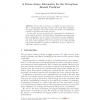Free Online Productivity Tools
i2Speak
i2Symbol
i2OCR
iTex2Img
iWeb2Print
iWeb2Shot
i2Type
iPdf2Split
iPdf2Merge
i2Bopomofo
i2Arabic
i2Style
i2Image
i2PDF
iLatex2Rtf
Sci2ools
195
click to vote
APCSAC
2007
IEEE
2007
IEEE
A Power-Aware Alternative for the Perceptron Branch Predictor
Abstract. The perceptron predictor is a highly accurate branch predictor. Unfortunately this high accuracy comes with high complexity. The high complexity is the result of the large number of computations required to speculate each branch outcome. In this work we aim at reducing the computational complexity for the perceptron predictor. We show that by eliminating unnecessary data from computations, we can reduce both predictor’s power dissipation and delay. We show that by applying our technique, predictor’s dynamic and static power dissipation can be reduced by up to 52% and 44% respectively. Meantime we improve performance by up to 16% as we make faster prediction possible.
Accurate Branch Predictor | APCSAC 2007 | Hardware | Perceptron Predictor | Predictor’s Power Dissipation |
| Added | 02 Jun 2010 |
| Updated | 02 Jun 2010 |
| Type | Conference |
| Year | 2007 |
| Where | APCSAC |
| Authors | Kaveh Aasaraai, Amirali Baniasadi |
Comments (0)

